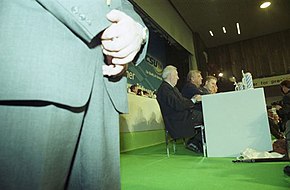Political class

Political class generally describes the social leadership class of the professional politicians ( colloquially also politicians caste or politicians guild ), in a critical way also the politicians as power- obsessed and self- centered social class . The name was first used at the end of the 19th century by the Italian political scientist Gaetano Mosca .
In 1993, the German political scientist Klaus von Beyme justified a resurgence of the political class through the de-ideologization of political parties , their rapprochement with the type of people's parties , the approximation of the social background of parliamentarians in addition to income adjustments and the resulting emergence of a class of professional politicians. Former German Chancellor Helmut Schmidt counted politicians as well as political journalists in the political class.
The sociology of elite attests to the political elite that for them politics has not only become an occupation , but that it is increasingly isolating itself from the population , no longer renewing itself through social mobility and thereby distancing itself from the interests that it claims to represent. The political elite of a country also includes the privileged group that regularly exercises political power through top political and economic positions and thus makes significant decisions on questions of society as a whole and controls social resources .
France
In France , classe politique has long been a common political term, also due to the fact that the leading personnel of the parties and ministries come almost exclusively from elite universities such as B. the ENA recruited.
Switzerland
In Switzerland , classe politique became a political stimulus with which the Swiss People's Party (SVP) criticized "those up there in Bern " and wanted to present itself as the true representatives of the people. In contrast, the voters of the SVP are much less traditional and conservative than the party leadership. Conversely, the electorate of the Social Democratic Party of Switzerland (SP) clearly wants “less state” than the party leadership.
literature
- Jens Borchert (Ed.): Politics as a profession. The political class in western democracies. Opladen 1999.
- Dietrich Herzog: Do we need a political class? In: From Politics and Contemporary History , Volume 50, 1991.
- Thomas Leif u. a. (Ed.): The political class in Germany. 1992, ISBN 978-3-416-02391-7
- Gaetano Mosca : The ruling class. Basics of political science . Lehnen, Munich 1950 (Italian first publication 1896: Elementi di scienza politica ).
- Klaus von Beyme : The political class in the party state. Suhrkamp, Frankfurt 1993.
Individual evidence
- ↑ Gaetano Mosca : The ruling class. Basics of political science . Lehnen, Munich 1950 (Italian first published in 1896).
- ↑ Klaus von Beyme : The political class in the party state. Suhrkamp, Frankfurt 1993.
- ↑ Thomas Heberer : The political elites. In: Derselbe, Claudia Derichs (ed.): Introduction to the political systems of East Asia: PR China, Hong Kong, Japan, North Korea, South Korea, Taiwan. 2nd, updated and expanded edition. Verlag für Sozialwissenschaften, Wiesbaden 2008, ISBN 978-3-531-15937-9 , p. 75 ( side view in the Google book search).